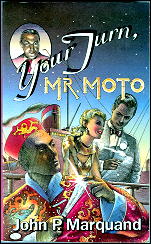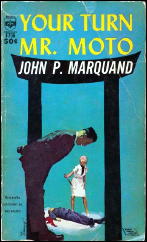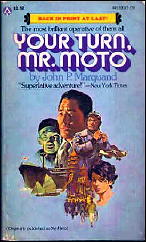Mon 15 Mar 2010

JOHN P. MARQUAND – Your Turn, Mr. Moto. Little Brown, paperback reprint, July 1985. Originally published in hardcover as No Hero: Little Brown, 1935. Previously serialized in The Saturday Evening Post, 30 March to 04 May 1935, as “Mr. Moto Takes A Hand.” First published as Your Turn, Mr. Moto by Berkley, F756, ppbk, May 1963. Other reprint editions include Popular Library, pb, 1977.
It is difficult to say, for me that is, at this point of time, how it happened that Mr. Moto, an agent of the Japanese empire before World War II, become such a popular series character in the United States.
He is a key figure in Your Turn, for example, the first book in the series, but while he appears frequently at regular intervals, he is not on stage all that long. He is an instigator and a facilitator as far as the story line is concerned, but as an investigator, much of his work is conducted behind the scenes.

He is also inscrutable, in the sense of the word often used to describe Asians (having motives that are not readily investigated, interpreted, or understood), which may help understand his appeal.
The story itself is told in first person by a washed-up American daredevil pilot named Casey Lee. Having one last contract canceled, a stunt that would have involved a flight across the Pacific starting from Japan, Casey rails against the world in a drunken furor, including the US, words overheard and relayed to Mr. Moto, who decides that he can make good use of the self-expatriated aviator.
As part of the enticement, as if Casey needed one, as he’s desperately in need of a job, no matter who offers it, is a young woman named Sonya, a White Russian in exile herself. The plot and the situation that Casey soon finds himself in are both complicated and simple. Plans for converting oil into a fuel that will double the range of ships and planes are missing, and Casey may be the person who unknowingly knows where they are.

Marquand’s writing is clear, smooth and informative. In those days before World War II, every nation involved in the affairs of the Far East, which included both Britain and the US, as well as Japan, China and Russia, have a stake in them, and Marquand makes each country’s perspective much more understandable than any textbook I had in high school ever did.
The backdrop of a region on edge, filled with refugees going here and there and an agent from every major power always within earshot, is equally well done, nearly to perfection.
It is disappointing, then, to have to say that the key points of the mystery itself, as opposed to the setting and the budding romance (which of course?) are muddled. Not badly, but enough to cause me to wish more Marquand had decided to focus on it more than he did.
March 15th, 2010 at 4:48 pm
Mr. Moto always seemed to operate in the background in the series, never taking the front row as he did in the films. Marquand’s plots never really improve all that much, the fascination being with his evocation of the Far East and the portrayal of the various factions and their complex interactions.
In that he looks forward to the modern post war spy novel. Moto himself remains enigmatic, an ardent Japanese nationalist, but somewhat embarrassed by some of his countries actions. Just why he became the popular character he did is likely because his adventures reflected the headlines, and Marquand — whatever his shortcomings as a mystery writer — was a very good writer who believed in his creation and it shows.
Moto is what Rex Stout called a ‘created character,’ one that takes on a life beyond the printed page.
And keep in mind this was the same period of Terry and the Pirates and Pearl Buck’s novels and interest in the Far East was high. Marquand and Moto just happened along at the right place and the right time.